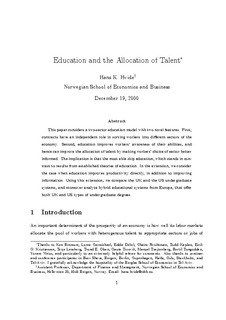| dc.description.abstract | This paper considers a two-sector education model with two novel features. First, contracts have an independent role in sorting workers into different sectors of the economy. Second, education improves workers’ awareness of their abilities, and hence can improve the allocation of talent by making workers’ choice of sector better informed. The implication is that the most able skip education, which stands in contrast to results from established theories of education. In the extension, we consider the case when education improves productivity directly, in addition to improving information. Using this extension, we compare the UK and the US undergraduate systems, and moreover analyze hybrid educational systems from Europe, that offer both UK and US types of undergraduate degrees. | en |
